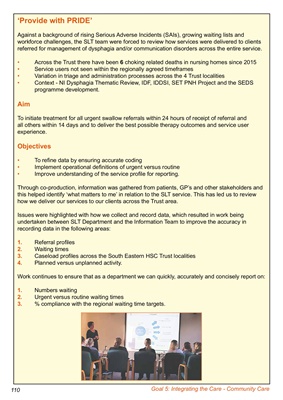
'Provide with PRIDE'
Against a background of rising Serious Adverse Incidents (SAIs), growing waiting lists and
workforce challenges, the SLT team were forced to review how services were delivered to clients
referred for management of dysphagia and/or communication disorders across the entire service.
• Across the Trust there have been 6 choking related deaths in nursing homes since 2015
• Service users not seen within the regionally agreed timeframes
• Variation in triage and administration processes across the 4 Trust localities
• Context - NI Dysphagia Thematic Review, IDF, IDDSI, SET PNH Project and the SEDS
programme development.
Aim
To initiate treatment for all urgent swallow referrals within 24 hours of receipt of referral and
all others within 14 days and to deliver the best possible therapy outcomes and service user
experience.
Objectives
• To refine data by ensuring accurate coding
• Implement operational definitions of urgent versus routine
• Improve understanding of the service profile for reporting.
Through co-production, information was gathered from patients, GP's and other stakeholders and
this helped identify 'what matters to me' in relation to the SLT service. This has led us to review
how we deliver our services to our clients across the Trust area.
Issues were highlighted with how we collect and record data, which resulted in work being
undertaken between SLT Department and the Information Team to improve the accuracy in
recording data in the following areas:
1. Referral profiles
2. Waiting times
3. Caseload profiles across the South Eastern HSC Trust localities
4. Planned versus unplanned activity.
Work continues to ensure that as a department we can quickly, accurately and concisely report on:
1. Numbers waiting
2. Urgent versus routine waiting times
3. % compliance with the regional waiting time targets.
110 Goal 5: Integrating the Care - Community Care